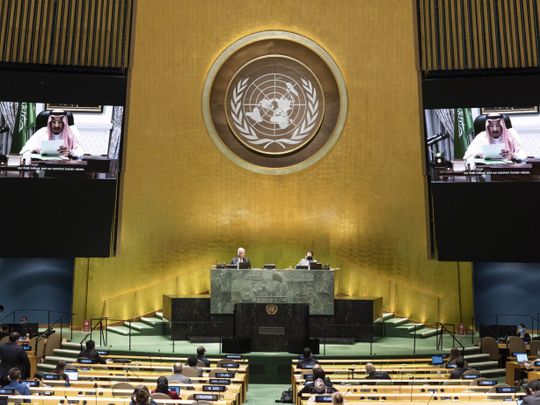
It has overseen an era of relative peace since the horrors of two world wars, avoided nuclear catastrophe, brought nations together for substantive action against poverty and hunger and adopted game-changing global projects such as the Millennium Development Goals, the Paris Agreement on climate change and the 2030 Agenda for Sustainable Development.
Yet, as the UN celebrates its platinum jubilee, it confronts a deeply polarised world at an inflection point in history.
The signing of the United Nations Charter in 1945 heralded a new era in human history: one defined by a consensus-driven, rules-based international order guided by multilateralism. Today more than ever, the UN needs to renew and update its commitment to that charter as the blueprint for peace and prosperity around the world
A wave of xenophobia and hatred is sweeping societies from the US to Europe and Asia, triggering geopolitical tensions and increasing the threat from nuclear weapons. Regional conflicts are on the rise, tariff wars threaten the foundation of free trade across the globe, biodiversity is collapsing and tangible impacts of climate change are manifesting themselves from California to China.
The added onslaught of the coronavirus pandemic has laid bare the world’s fragilities — whether in terms of a rapidly shrinking global economy, growing inequality in income, jobs and gender balance, or lack of adequate health care for the most vulnerable segment of the global population.
As acknowledged by the UN director-general Antonio Guterres, the world faces a surplus of challenges and a deficit of multilateral solutions.
It is for this precise reason that the UN needs to urgently speed up meaningful structural reforms and focus on effective action that can help the agency remain relevant. For a world verging on chaos and unilateralism, there’s simply no alternative to the multilateral platform of the United Nations — it’s still the only place on earth where 193 nations can assemble together for dialogue and debate.
Resisting the change
But for too long, the UN has resisted change, failed to tackle corruption and nepotism or refused to acknowledge the emerging new world order. The UN Security Council, for instance, remains a Cold War relic that hardly resonates with contemporary realities. Whether it’s countries such as the UAE — which embodies the UN charter of peace, security and sustainable development in letter and spirit — or the G4 bloc of Japan, Germany, India and Brazil, the UN is in urgent need of expansion to incorporate new blood in its key decision-making body.
It also needs to address new threats such as cyberattacks and the theft of intellectual property with agility and stronger legal teeth.
The signing of the United Nations Charter in 1945 heralded a new era in human history: one defined by a consensus-driven, rules-based international order guided by multilateralism. Today more than ever, the UN needs to renew and update its commitment to that charter as the blueprint for peace and prosperity around the world.







